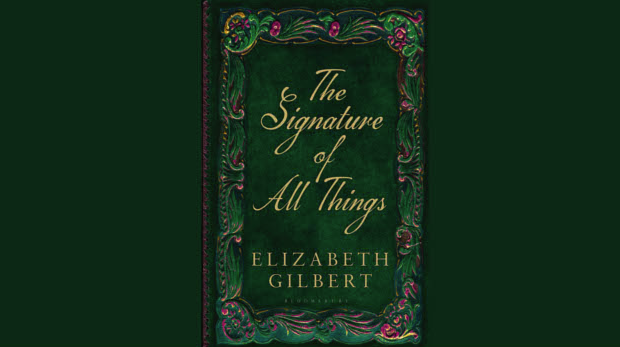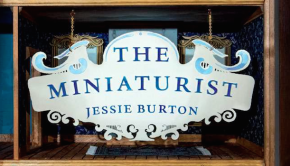The Signature of All Things by Elizabeth Gilbert
| Press reviews | Buy the book | Have your say |
Blurb: 5 January 1800. At the beginning of a new century, Alma Whittaker is born into a perfect Philadelphia winter. Her father, Henry Whittaker, is a bold and charismatic botanical explorer whose vast fortune belies his lowly beginnings as a vagrant in Sir Joseph Banks’s Kew Gardens and as a deck hand on Captain Cook’s HMS Resolution. Alma’s mother, a strict woman from an esteemed Dutch family, has a knowledge of botany equal to any man’s. It is not long before Alma, an independent girl with a thirst for knowledge, comes into her own within the world of plants and science. But as her careful studies of moss take her deeper into the mysteries of evolution, the man she comes to love draws her in the opposite direction – into the realm of the spiritual, the divine and the magical. She is a clear-minded scientist; he is a Utopian artist. But what unites this couple is a shared passion for knowing – a desperate desire to understand the workings of this world and the mechanisms behind all of life. (Bloomsbury, 2013)
Elizabeth Day, The Observer
“When Ambrose Pike, a gifted lithographer who makes glorious pictures of orchids, comes to stay at the Whittaker family estate, she falls in love, but the relationship does not provide the answers Alma was hoping for. From this point, Gilbert really hits her stride. When Alma’s father dies, she sets off on an epic journey of discovery to examine the flora and fauna of Tahiti … Each passage of this sprawling novel is written with an astonishing eye for just the right amount of period or environmental detail. The character of Alma Whittaker is so believable, so deeply drawn and so likable for its complexity and open spirit, that it is impossible not to be engrossed by every twist and turn of her thoughts and imaginings.”
Susie Boyt, The Financial Times
“Parts of the novel are written in the charming, fluent prose of a well-loved fireside storyteller. Other passages make you think of the most outlandish holiday postcards you could possibly receive: “went turtling and ate dolphins”. There are moments that seem inspired by Charles Dickens and others where the self-reflective spirit of a Charlotte Brontë heroine guides the author’s pen. In the main, the writing is deft, assured and unpretentious.”
Janet Maslin, The New York Times
“Miraculously, The Signature of All Things remains engrossing even though its heroine has been unloved and homebound throughout that time. Then, at the book’s midpoint, highly implausible things happen. Alma enters a marriage that lasts only a week. She banishes her husband. Then, with shades of Eat, Pray, Love, she spends many pages traveling the world trying to fathom her loss and recover from it. Plausibility grows scarce during the book’s second half. But Ms. Gilbert’s wanderlust gets a chance to flourish. So does the love of knowledge that animates all of The Signature of All Things especially when Alma begins independently discovering what the greatest minds of her generation are also learning.”
Barbara Kingsolver, The New York Times
“A scientifically minded reader might want a few more details about what Alma sees through her microscope as she classifies her discoveries. Admittedly, a reader otherwise inclined might prefer the Victorian equivalent of a car chase; you can’t please everyone. The novel is frontloaded with its most hair-raising exploits as back story on Alma’s father, a plant thief whose boyhood punishment was to be packed off on the madcap voyages of Captain Cook. Real events provide ample substrate for a novel that entwines the historic and the imagined so subtly as to read like good nonfiction for most of its first half. It crosses over to page turner after the introduction of the author’s most beguiling invention, the deliciously named Ambrose Pike.”
Marie Arana, The Washington Post
“The Signature of All Things is not, by any means, a seamless novel. There are moments of jarring prose, of nonsensical leaps, of characters going places you doubt they would ever go. But there are far more moments of transcendence, of Gilbert reaching — with absolute confidence — for a higher sphere … Gilbert has been a journalist, a biographer, short-story writer, novelist, memoirist and, perhaps most famously, a celebrated “Oprah author,” but she continues to set higher goals for herself. Like Victor Hugo or Émile Zola, she captures something important about the wider world in The Signature of All Things: a pivotal moment in history when progress defined us in concrete ways.”
Jane Shilling, The Telegraph
“Gilbert has spoken of her admiration for Hilary Mantel’s Wolf Hall, and its influence is evident in the broad historical scope of The Signature of All Things with its ambition to refract universal questions about human nature through the experience of a complex individual. Gilbert’s narrative lacks the keen, uncompromising edge of Mantel, and her minor characters are not always conjured with absolute precision … Nevertheless, this is a big novel in all senses – extensively researched, compellingly readable and with a powerful charm that will surely propel it towards the bestseller lists.”
Lucy Atkins, The Sunday Times
“This book may not be “achingly” slow, but the pace is reminiscent of a hefty 19th-century novel. Time rolls by and ideas are probed at leisure. Readers prepared to enter Gilbert Time will be rewarded: she is an unflaggingly curious writer, prone to delightful touches (Alma’s mother, for instance, dresses “in the full spectrum of colours that one associates with common house sparrows”). Alma herself is tenderly drawn. She has a fierce intellect, a kind heart, “blacksmith’s arms” and “sturdy boots” and manages to live, with dignity, in a society where women must be decorative.”
Stevie Davies, The Guardian
“”Less is more” is hardly the author’s watchword. The novel displays its own narrative excesses in those of the heroine: six-foot giantess Alma’s knowledge of “global bryology [was] excruciatingly dense”; she is aware that “my world has become too detailed”. Gilbert’s style is comparable: long paragraphs effloresce with superabundant detail. It’s a tall tale, told with verve and wit – but all on the same note. And as the style of heavy levity can rarely adapt, so character cannot change, only disport itself in further prodigious arabesques.”
Carolyn Kellogg, The L.A. Times
“Gilbert can be a delightful writer, and this book is full of turns of phrase that manage to be both fresh and evoke an antique period … But sending Alma to Tahiti is problematic. She winds up seeking out a mysterious, beautiful Tahitian man: He is charismatic, knowing and sexually liberating. It’s hard not to squirm a little at the cultural imperialism, a criticism leveled at Eat, Pray, Love.”
Helen Dunmore, The Times
“This is a novel to read for its subject matter and narrative drive. Gilbert’s prose, like the character of her protagonist, is emphatic, somewhat rough and ready, and bent on observation.”
Buy the book
Amazon | Foyles | Hive | Waterstones












